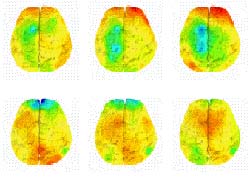Brain Imaging Study Reveals Placebo’s Effect

Image: Courtesy of Andrew Leuchter et al.
Scientists have recognized for some time that people suffering from depression often experience a substantial reduction in symptoms when given a placebo. In fact, this observation has led some researchers to propose that up to 75 percent of the apparent efficacy of antidepressant medicine may actually be attributable to the placebo effect. Determining the cause of a patient’s improvement under such circumstances is no easy task. But the results of a new study may shed light on the matter. According to a report in the January issue of the American Journal of Psychiatry, depressed patients who respond to placebo treatment do exhibit a change in brain function, but one that differs from that seen in patients who respond to medication.
Using so-called quantitative electroencephalography imaging, a team of researchers at the University of California at Los Angeles studied electrical activity in the brains of 51 depressed patients receiving either placebo treatment or active medication. Patients who responded favorably to the placebo, the investigators found, showed increased activity in a region of the brain known as the prefrontal cortex. Those who responded to medication, in contrast, exhibited suppressed activity in that area. The image shown here illustrates changes in prefrontal cortex activity over time in the placebo responders group (top row) and the medication responders group (bottom row), with red indicating an increase in activity and blue-green representing a decrease. “Both treatments affect prefrontal brain function,” the researchers write, “but they have distinct effects and time courses.”
These results “show us that there are different pathways to improvement for people suffering from depression,” team member Andrew Leuchter notes. “Medications are effective, but there may be other ways to help people get better,” he adds. “If we can identify what some of the mechanisms are that help people get better with placebo, we may be able to make treatments more effective.”
Media Contact
More Information:
http://www.sciam.com/news/010202/1.htmlAll latest news from the category: Health and Medicine
This subject area encompasses research and studies in the field of human medicine.
Among the wide-ranging list of topics covered here are anesthesiology, anatomy, surgery, human genetics, hygiene and environmental medicine, internal medicine, neurology, pharmacology, physiology, urology and dental medicine.
Newest articles

Sea slugs inspire highly stretchable biomedical sensor
USC Viterbi School of Engineering researcher Hangbo Zhao presents findings on highly stretchable and customizable microneedles for application in fields including neuroscience, tissue engineering, and wearable bioelectronics. The revolution in…

Twisting and binding matter waves with photons in a cavity
Precisely measuring the energy states of individual atoms has been a historical challenge for physicists due to atomic recoil. When an atom interacts with a photon, the atom “recoils” in…

Nanotubes, nanoparticles, and antibodies detect tiny amounts of fentanyl
New sensor is six orders of magnitude more sensitive than the next best thing. A research team at Pitt led by Alexander Star, a chemistry professor in the Kenneth P. Dietrich…





















